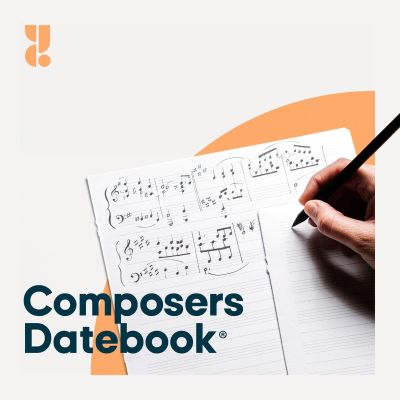Composers Datebook™ is a daily two-minute program designed to inform, engage, and entertain listeners with timely information about composers of the past and present. Each program notes significant or intriguing musical events involving composers of the past and present, with appropriate and accessible music related to each.
Gesamtlänge aller Episoden: 3 days 20 hours 54 minutes
Monserrate Ferrer Otero
A remarkable shift of focus in music history occurred in the latter part of the 20th Century when performers and musicologists began turning their attention to neglected works by women composers of the past and present. Composers like Hildegard von Bingen, Clara Schumann, Amy Beach, Rebecca Clarke, and Florence Price began to receive the attention they deserved. In the 21st century, much work remains to be done on this front, however...
Frederick the Great's revenge?
On today’s date in 1755, “Montezuma,” an opera by the German Baroque composer Carl Heinrich Graun, had its premiere performance at the Berlin Court Opera of Frederick II, King of Prussia. Frederick himself supervised the rehearsals, which isn’t all that surprising, since he had drafted the opera’s libretto. Despite his well-deserved reputation as a military leader, Frederick the Great was also a talented musician and composer...
Exploding Boulez
On today’s date in 1973, the Chamber Music Society of Lincoln Center premiered a new work by Pierre Boulez for solo flute and seven instruments, plus interaction with an electronic computer program, which generated sounds that reacted to (and interacted with) the solo flute. The piece was titled “explosante-fixe,” which translates as “exploding-fixed.” At the time, however, Boulez was frustrated by the still primitive computer technology...
Liszt gets political
In essence, the music of the 18th century was an international, cosmopolitan language, but just as “nationalism” in language, culture, and politics came to the fore in the 19th century, so did the radical new idea that each nation should develop its own, distinct, “national” style of music. On today’s date in 1840, a dramatic manifestation of this new trend occurred in the city of Pest...
Rachmaninoff dances
On today’s date in 1941, the final orchestral work of the Russian composer Sergei Rachmaninoff received its premiere performance by the Philadelphia Orchestra, led by Eugene Ormandy. It was an orchestral suite, entitled “Symphonic Dances,” and was originally planned as a triptych depicting the passage of time, with its three sections to be titled: Midday, Twilight, and Midnight. For this new work, Rachmaninoff recycled some music from older one: an unfinished ballet from 1915...
Rouse's "Concert de Gaudi"
In one of his letters, the German poet Goethe dropped this memorable and frequently quoted line: “I call architecture frozen music.” If that’s the case, then this music might be accurately described as “unfrozen architecture,” since it was music inspired by the famous Spanish architect Antonio Gaudi, whose unfinished Temple of the Holy Family in Barcelona is an internationally famous landmark...
Gardiner and Bach's Cantatas
Today we celebrate hopeful beginnings – and happy endings. In Leipzig, on New Year’s Day 1724, Johann Sebastian Bach led the first performance of “Singet dem Herrn ein neues Lied“ (or “Sing to the Lord a New Song” in English) – a work we now know as his Cantata 190...
Gilbert and Sullivan take on the pirates
These days, “musical piracy” can mean anything from illegal downloads to bootleg compact discs pressed in China. But back in 1878, the smash success of the Gilbert and Sullivan operetta “HMS Pinafore” resulted in a flurry of unauthorized “pirate” productions in the United States. The two resourceful Englishmen decided the best way to put a stop to it was to premiere their next collaboration in New York, thereby establishing its copyright under American law...
Handel and Mattheson bury the hatchet
Now, 18th century opera is supposed to be a rather staid and stuffy affair. These operas invariably had happy endings, with all the messy human passion and conflicts amicably resolved by the opera’s finale. But 18th century, opera could arouse some serious emotion off-stage. In 1704, an 18-year-old composer named Georg Friedric Handel was employed as a violinist and harpsichordist in the orchestra of the Hamburg opera house...
The recomposing of Mr. Bruch
It might seem odd to think of Max Bruch as a twentieth century composer. After all, his three “Greatest Hits”—his Violin Concerto in G Minor, his “Scottish Fantasy” for violin and orchestra, and his setting of the Hebraic liturgical chant “Kol nidrei” for cello and orchestra -- were all written in the 19th century. But this archetypal German Romantic composer, who was born in 1838, lived to the ripe old age of 82, and kept producing new works up to the time of his death in 1920...
